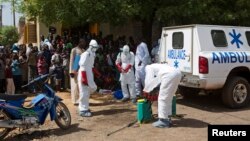Senegal and Nigeria were able to stop small Ebola outbreaks by closely monitoring those who had contact with the sick person and quickly isolating anyone with symptoms.
Mali is scrambling to do the same now, almost a month after a 70-year-old Guinean imam sought treatment at a clinic in Bamako. Five people have already died. Mali confirmed a sixth related Ebola case Saturday; a female relative of a nurse who treated the imam.
Every day, twice a day, teams are checking just over 300 people around Bamako. All of these contacts are linked to the Guinean imam who died of Ebola at a private clinic October 27, two days after he had arrived for treatment.
Monitors have caught one case so far - a female relative of a nurse who died after treating the imam. The nurse had the most contacts - 98.
VOA accompanied monitors to the house. At least 40 family members line up in the courtyard to have their temperatures taken.
Two boys, the self-appointed soap police, man a hand washing station at the door.
The head of the household scolds one boy who takes too long to get up when his name is called. The monitors ask about symptoms. The first half of one monitor’s spreadsheet is column after column of tiny handwritten zeroes. No symptoms.
Not all of the contacts are as cooperative as this family. A few do go missing. Monitors think one man went to his village, but phone networks are bad.
“You haven’t been able to reach him?” Dr. Ramata Sacko asks the team at a meeting later. “Didn’t we tell him not to travel?”
Dr. Sacko is coordinating for Ebola monitoring efforts. The teams are learning on the job.
“If they don’t come to us, we go to them,” she tells the team. “If we can figure out his village, we can see if there is a health post there and get him that way. Because this is the critical period,” she says. “We don’t want him to develop symptoms there.”
Mali is playing catch-up. The circle of contacts widened rapidly in the two weeks that went by before health authorities here found out about the imam. The clinic had not tested him.
The World Health Organization in Guinea figured it out while investigating other cases in the imam’s family. Dr. Ibrahima Soce Fall of the WHO in Mali got the news. By then, at least three people in Mali were already sick. It's a cautionary tale for other countries in the region.
Dr. Fall says “this never should have happened in a private or public clinic. Everyone knows the situation in Guinea. Had we known sooner,” he says, “we could have prevented a certain number of contacts. It was late.”
Mali is investigating the clinic and how the sick imam got past border police in Kouremale. The town straddles the border. The imam was from the Guinean side. He was buried there after he died in Bamako.
At the border, Malian health workers now check everyone who comes in.
Health workers write down names, phone numbers, destinations. They say their orders are to turn back anyone with a medical condition.
A frustrated Malian man sits with his luggage at the town’s health center. He broke his arm in Conakry. They will not let him cross. He worries people will think he has Ebola.
At the Kouremale health center, Ebola information sheets in pristine plastic sleeves paper the walls. Medical staff wear gloves and sanitize equipment between patients.
Chief Dr. Drissa Berte says they started after the imam. “Everyone is afraid but we're health workers so we cannot show it.” He says “we have to stay calm. If we show we are afraid, it would be panic.”
The clinic has a small isolation tent and a makeshift ambulance. A larger isolation unit is under construction behind the border post. But an infected person may not show symptoms at the border. Ebola has a 21-day incubation period. The whole country has to be vigilant.






